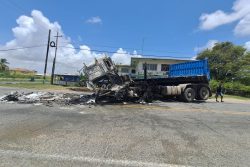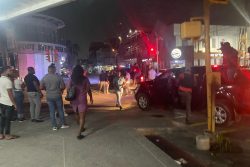SAO PAULO, (Reuters) – Shocking violence at a Brazilian championship match this weekend is not an indication of what can be expected when the South American country hosts the World Cup next year, FIFA said yesterday.
At least 30 people have been killed in incidents in and around Brazil’s stadiums this year, one expert said, after three people were seriously injured when fans fought running battles at the Atletico Paranaense versus Vasco da Gama match.
Sunday’s game on the final day of the season had to be halted for 70 minutes. Some players broke down in tears as they watched fans chase each other round the terraces, trading blows and hitting each other with home-made sticks and weapons.
“For a country that is hosting the World Cup next year this is very sad,” said Alessandro, the Vasco goalkeeper. “The stadium isn’t safe. From what we can see the fans aren’t segregated.”
A police helicopter landed on the pitch to ferry one unconscious fan to hospital. The game was eventually restarted and Atletico won 5-1, relegating Vasco to the second division.
The fighting brought back memories of the blackest days of European football in the 1980s and it was another graphic sign that football violence is worsening in Brazil.
“Something has changed, and for the worse,” said Mauricio Murad, a Rio de Janeiro sociologist who wrote the book ‘How To Understand Football Violence’.
“Over the last five or six years violence inside stadiums was under control and it was only bad outside the grounds. What we’ve seen over the last few weekends is a return to violence inside the stadiums.”
Brazil’s Sports Ministry called for swift punishment for hooligans. In a statement it said it would consult with public prosecutors and police chiefs over future policing of matches. There were no police inside the Arena Joinville where the game took place yesterday because the home side had opted to use private security guards.
President Dilma Rousseff condemned the troublemakers and called for a special police station to be set up to deal with football-related incidents.
However, Murad said authorities have long known about the problem and had not taken any serious action. At least 30 people have been killed in and around stadiums this year in Brazil, seven more than last year, he said.
Murad blamed organised fan groups, many of whom are sponsored by clubs, for much of the trouble.
Lance, Brazil’s best-selling sports newspaper, said 234 had been killed in football violence since 1988. The paper recently called the organised fan groups “gangsters dressed up as football fans” and blamed the authorities for not doing more.
The paper suggested police take simple steps such as making known hooligans report to police stations on match days, a tactic that was successful in England.
“The problem is not the lack of laws but the lack of commitment and rigour shown by authorities in upholding the laws that exist,” the paper said in a front-page editorial in October after fans fought with police at the Sao Paulo derby between Sao Paulo and Corinthians. On Monday, the paper printed the colourful World Cup logo in black and white. The tournament will be held in South America next year for the first time since 1978. FIFA was quick to tell fans they should not fear violence at next year’s tournament that will be held in 12 new or totally modernised stadiums across the country.
HEAVY SECURITY
Unlike Sunday’s game, which was organised by local clubs under the auspices of the Brazilian Football Confederation, World Cup matches are organised by FIFA and will count on heavy security both inside and outside the stadium.









